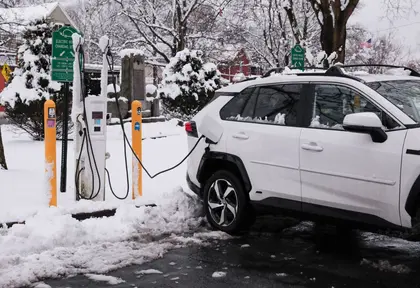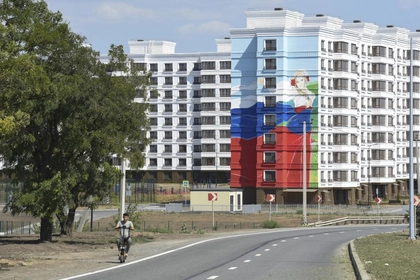Ukraine’s Prime Minister Denys Shmyhal said the country could kickstart an electric vehicle (EV) industry with its vast lithium reserves, which could satisfy domestic demand in five years and later lead to exports.
“Lithium deposits make it possible to create a full cycle of electric car production, not only for domestic needs but also for export,” said Shmyhal at a forum dedicated to the two-year anniversary of the Diia City special tax regime.
JOIN US ON TELEGRAM
Follow our coverage of the war on the @Kyivpost_official.
According to an official press release, there are plans to introduce EV makers to the Diia City program “in the near future” alongside other tech innovators such as bionic prostheses manufacturers.
The Ministry of Digital Transformation told dev.ua, a Ukrainian tech news outlet, that many Ukrainian companies already have experience working with the automotive industry and developing operating systems for cars, autonomous control systems, and electric motor control systems, among others.
“These are huge prospects for Ukraine – not just to be an exporter of lithium – but to establish full-cycle production here and create products with high added value for domestic and foreign markets. For this, it is necessary to create favorable conditions. So, we want to do it within ‘Diia City’,” the press release said.
Forbes last year reported that Ukraine’s lithium ore reserves make up one percent of global reserves and a third of Europe’s reserves.

IMF Approves $1.1 Billion Loan Disbursement to Ukraine Before Trump Inauguration
“Ukraine's lithium reserves are enough to provide batteries for almost 20 million electric cars,” said Roman Opimakh, head of the State Geodesy, adding that the exact amount of lithium reserves remained confidential.
Challenges with battery production
Whilst Ukraine has the potential to develop its domestic EV industry, the process might be more nuanced than appears at first glance.
Before moving to EV manufacturing, the production of lithium batteries alone already presents a series of challenges.
In a column for Interfax published in May 2023, Denys Alyoshin, director of strategic development of UkrLithium Production LLC, said there are four known lithium deposits in Ukraine, but one is in occupied parts of the Donetsk region, while another one sits close to the front in the Zaporizhzhia region.
Alyoshin said surveys of all four sites took place under the Soviet regime, but the regime did not carry out mining operations.
He said a new, modern survey is needed to confirm the deposits – at least at sites under Ukrainian control – then a mine would need to be constructed. Following that, new factories would be needed to turn the ores into industrial products, requiring international investment and expertise.
“In such a high-tech field, there are certain requirements for each stage of production – from ore and concentrate, to finished batteries. This requires hundreds of millions of dollars of investment, enormous international experience and years of patience, even without wars and quarantine restrictions,” said Alyoshin.
Alyoshin expressed belief ni the prospects of Ukraine’s integration into the global EV market and that it could create many job opportunities, but noted that it “should be the dream or goal of the post-war transformation of the Ukrainian economy.”
Existing EV makers in Ukraine
Batteries aside, Ukraine lacks the ability at present to produce certain components to sustain full production. Currently, there are a number of EV makers in Ukraine with varying degrees of production maturity.
Oleksandr Lytvyn, CEO of the Ukrainian e-bike maker Bayka, told dev.ua that Ukraine has produced electric buses and trolleybuses, but consumer electric cars have only reached “project” stage.
Serhii Denysenko, COO and co-founder of the e-bike maker Delfast Bikes, told dev.ua that there are only three EV companies in the country – COOLON, currently on hold during the war, LUAZ, a rebranded Soviet offroad vehicle factory that turned electric, and Electron, an electrical company in Lviv that also produces electric transport vehicles.
Denysenko told dev.ua that his company sought most components from abroad, as only the metal and plastic parts could be manufactured in Ukraine.
An article from Ukrainska Pravda, published in January 2023, covered the development of LUAZ. Originally a Soviet automotive maker in the Lutsk region that underwent restructuring and bankruptcy, it was revived by the current owner Vadim Ignatov as an EV maker.
However, it appears that LUAZ mostly solicited the help of Chinese original equipment manufacturers (OEMs), with most components made in China.
Ignatov said the lack of components and manufacturing facilities in Ukraine has prompted LUAZ to utilize foreign components, but the company was exploring the feasibility of using Ukrainian-made components, such as batteries from Ukrainian manufacturer EmGo Technology, based in Odesa.
However, the engine remained Chinese-made due to the lack of options domestically.
“There is a very simple asynchronous motor with a capacity of 5 kW, but we did not find manufacturers in Ukraine either,” added Ignatov.
As such, Ukraine’s EV dream remains a daunting task – not impossible, but there is still a long way to go.
However, if successful, the plans will allow Ukraine to capitalize on the EU’s 2035 zero-emission goal to go full-electric, and Kyiv’s growing ties with the bloc have provided just the right political and economic settings to do so.
All that remains is for Ukraine’s industry to pick up the pace and catch up with the trend, but even where there’s a will, there’s still a long way to go.
You can also highlight the text and press Ctrl + Enter






